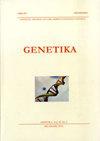GDNF rs2910702, rs3096140, and rs3812047 polymorphisms in obsessive compulsive disorder: Preliminary study
4区 农林科学
Q3 Agricultural and Biological Sciences
引用次数: 0
Abstract
The neurobiology of obsessive-compulsive disorder (OCD) is evidenced by a strong demonstration of malfunctions in the serotonergic and dopaminergic system. Recently, glial cell line-derived neurotrophic factor (GDNF) gene polymorphisms have been emphasized in psychiatric diseases and treatment strategies that have been tried to be developed in this regard. In the literature, there are several studies investigating the relationship between GDNF gene polymorphisms and psychiatric diseases excluding OCD. Therefore, this study aimed to compare the symptomatology and GDNF gene polymorphisms in early and late-onset OCD patients. For this purpose, patients diagnosed with OCD according to DSM-V diagnostic criteria in structured clinical interviews were grouped as early and late-onset based on the age of initiation. DNA was isolated from blood samples collected from 140 subjects (70 OCD and 70 healthy controls) in EDTA tubes, and rs2910702, rs3096140, and rs3812047 polymorphisms in GDNF gene were examined by Real-Time PCR. No significant correlation was detected between GDNF and the rs2910702, rs3096140, and rs3812047 polymorphisms in early and late-onset OCD subjects (P>0.05). Failure to detect correlations between OCD and GDNF gene polymorphisms might be due to the variable expression pattern of the GDNF gene in different tissues and pathologies. Therefore, future studies might be improved by including a larger group of patients and examining a wider range of tissues for the expression pattern of GDNF.GDNF rs2910702、rs3096140和rs3812047在强迫症中的多态性:初步研究
强迫症(OCD)的神经生物学是由血清素和多巴胺能系统的功能失调所证明的。近年来,神经胶质细胞系来源的神经营养因子(GDNF)基因多态性在精神疾病中的研究越来越受到重视,并试图在这方面制定治疗策略。在文献中,有几项研究调查了GDNF基因多态性与除强迫症外的精神疾病之间的关系。因此,本研究旨在比较早发性和晚发性强迫症患者的症状学和GDNF基因多态性。为此,在结构化的临床访谈中,根据DSM-V诊断标准诊断为强迫症的患者根据发病年龄分为早发性和晚发性。从140例受试者(70例强迫症患者和70例健康对照)的EDTA管血样中分离DNA,采用Real-Time PCR检测GDNF基因rs2910702、rs3096140和rs3812047多态性。早发性和晚发性OCD受试者中,GDNF与rs2910702、rs3096140、rs3812047多态性无显著相关性(P < 0.05)。未能检测到强迫症与GDNF基因多态性之间的相关性可能是由于GDNF基因在不同组织和病理中的表达模式不同。因此,未来的研究可能会通过纳入更大的患者群体和检查更广泛的组织来改善GDNF的表达模式。
本文章由计算机程序翻译,如有差异,请以英文原文为准。
求助全文
约1分钟内获得全文
求助全文
来源期刊

Genetika-Belgrade
AGRONOMY-GENETICS & HEREDITY
CiteScore
1.80
自引率
0.00%
发文量
1
审稿时长
6-12 weeks
期刊介绍:
The GENETIKA is dedicated to genetic studies of all organisms including genetics of microorganisms, plant genetics, animal genetics, human genetics, molecular genetics, genomics, functional genomics, plant and animal breeding, population and evolutionary genetics, mutagenesis and genotoxicology and biotechnology.
 求助内容:
求助内容: 应助结果提醒方式:
应助结果提醒方式:


